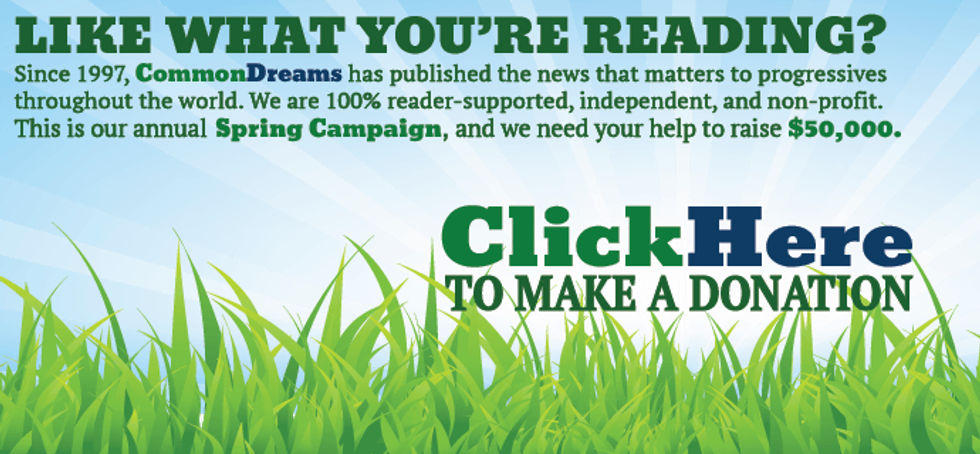SuperPACs and billionaires are bankrolling our elections, and as a result, most Americans have virtually no influence in our political system--a damning state of affairs for the world's oldest surviving democracy.
Yet, far from giving up, the American people are ready to take back their democracy. In fact, the electorate is united in its support for the needed reform: 85% of Americans want fundamental changes in the way we fund our elections; 72% of Americans support public financing of elections, the most necessary and urgent reform; and 78% want to overturn Citizens United.
Evidence of this new excitement can be seen in the recently concluded actions and events of Democracy Spring and Democracy Awakening--two movements centered on money in politics and voting rights.
On April 2nd, 150 "Democracy Spring" marchers left the Liberty Bell in Philadelphia to walk 140 miles to the nation's capitol. When they arrived in Washington, D.C., they, along with hundreds others, began six-straight days of civil disobedience, risking arrest by sitting in at the Capitol. And, on April 16, thousands of "Democracy Awakening" activists came together for three days of rallies, cultural events, teach-ins and another sit-in.
Between the two mobilizations, over 1,200 people were arrested, making them the most significant democracy protests in decades.
As the movement for reform reaches unprecedented momentum, it's worth reflecting upon all that has changed in such short time. Fifteen years ago, for example, when former NBA basketball player Adonal Foyle founded our organization, Democracy Matters, the movement to get big money out of politics looked quite different.
Although it was ten years before Citizens United and the creation of the first SuperPAC, in 2001 our democracy was already on life support. Those with money dominated political fundraising; corporate lobbyists had politicians on speed dial; and candidates talking about public financing of elections were mere urban legend. And yet, while many D.C. advocacy groups fought to preserve our democracy, campaign finance reform was not seen as an issue that could activate grassroots activism.
Democracy Matters was founded with the goal of creating and cultivating this grassroots effort, hoping to turn the fight for democracy reform into a social movement. Only when we could reinforce advocacy groups in D.C. with a diverse movement of citizens could we win the change we so desperately needed. And based on the premise that students have traditionally been at the forefront of political change, Democracy Matters began engaging and training youth to participate in the campaign finance reform movement.
Through on-campus chapters at colleges and universities, we built a cohort of young people passionately dedicated to getting big money out of politics. And, as these students graduated, they took their knowledge of and commitment to campaign finance reform into both the public and private sectors.
"Despite our newfound strength, the small group of political mega-donors who benefit handsomely from the status quo will not give up quietly."
A few years after we began, our chapters began to flourish in both number and size, and our coalition of college students started making big strides in their activism. They organized major campus events, teach-ins and lectures, and even lobbying days with their local legislatures. The biggest victory came in 2005 when a group of Democracy Matters students at Yale participated in the successful campaign to pass public financing of state election campaigns in Connecticut.
And then, at the start of the new decade, we experienced unexpected, rapid growth for two main reasons.
The first was Citizens United, the infamous Supreme Court case that allowed corporations to use their treasury funds to influence elections. Although detrimental to our democracy, this case served as a wake-up call for the need for comprehensive campaign finance reform. The result was that more Americans, many of whom were students, were drawn into the fight to get big private money out of politics.
A second spur came from the Occupy Wall Street movement. Its critique of growing income inequality and the rise of a small group of multi-billionaires galvanized student activists across the country. Within weeks of Occupy's appearance, Democracy Matters chapters doubled and tripled in size. These new student activists brought enthusiasm and new ideas, emphasizing the link between inequality and the power of a wealthy few to dominate the political system.
The movement demanding "Fair Elections" further expanded shortly thereafter, coming close to passing public financing in New York state two years in a row. This was followed by concrete victories, such as winning public financing reform in Seattle and Maine in 2015 and getting anti-corruption initiatives on the ballot for 2016.
Needless to say, the growth of a grassroots democracy movement--and our part in it--has been incredibly exciting. Yet, our fifteen years of organizing has taught us that we are embarked on a long and difficult struggle for change. Despite our newfound strength, the small group of political mega-donors who benefit handsomely from the status quo will not give up quietly. While we reflect on how far we have come toward fixing our democracy, we must continue to organize, build and strengthen coalitions, engage new voters, elect pro-reform candidates, and increase the grassroots pressure on those politicians who oppose a democracy of, by, and for the people.
The possibility of meaningful reform has never been greater.




